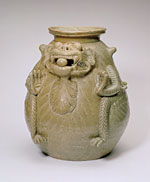| Legole.Com Discover china. Explore the beauty and wonder of the land, people, and culture of China. |
 |
|
|
 |
| |
 Caopi established the Wei Kingdom with the support from General Sima Yi. Throughout the Wei period the Sima family assisted three out of five kings of the Wei Kingdom. Gradually, they gained the control of the executive and military powers of the kingdom. After the death of Sima Yi, both of his two sons consequatively, became the dominant men of the kingdom. Caopi established the Wei Kingdom with the support from General Sima Yi. Throughout the Wei period the Sima family assisted three out of five kings of the Wei Kingdom. Gradually, they gained the control of the executive and military powers of the kingdom. After the death of Sima Yi, both of his two sons consequatively, became the dominant men of the kingdom.
In 265 AD, Sima Yan, the grandson of Sima Yi, deposed the emperor of Wei and established his own regime Jin, making Luoyang his capital city. Historically the dynasty is known as the "Western Jin Dynasty" and Sima Yan was known as Emperor Wu. In 280 AD, the Western Jin wiped out the Wu, the last surviving regime of the Three Kingdoms Period (220 - 265) and reunified the south and north.
Emperor Wu conferred dukedoms to many of his kinsmen due to their contributions in the founding and consolidation of the empire. Since the Jin was based on the power of hereditary aristocrats, measures were taken to protect the interests of the privileged, which often upset the big family. And consequently, conflicts between the aristocratic families increased. They contested with each in the accumulation of wealth and the enjoyment of the luxurious life. Thus the power of the Jin imperial government was seriously impaired.
Meanwhile, the struggle for power intensified in the imperial court. From 291 onwards, eight dukes of the royal family stirred up a series of wars against each other. These wars lasted 16 years, greatly dislocating the social economy and weakening the empire's power.
After these disturbances, the country was deep in chaos. In 308, Liuyuan, the chief of the Xiongnu tribe, crowned himself the king of Han. His army captured Luoyang, the capital of the Western Jin Dynasty and captured the emperor. The survivors of the Jin named another emperor in Chang'an (present Xian), the Xiongnu army broke into Chang'an in 316 and put an end to the Western Jin Dynasty.
The Western Jin Dynasty ruled fifty-one years with four emperors on the throne. After it, China went into another troubled period of disunity for 272 years.
|
|
|
 |
|
